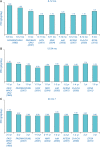Burden of Early Life Obesity and Its Relationship with Protein Intake in Infancy: The Middle East Expert Consensus
- PMID: 35360379
- PMCID: PMC8958054
- DOI: 10.5223/pghn.2022.25.2.93
Burden of Early Life Obesity and Its Relationship with Protein Intake in Infancy: The Middle East Expert Consensus
Abstract
Adequate nutrition in early life is proposed to shape a child's future health by launching the growth trajectory in the proper direction, which helps to avoid negative metabolic programming effects. Protein intake during infancy and early childhood is of great importance, as it plays a key role in infant metabolic programming and the future risk of obesity. Breastfeeding provides the best nutrition in early life, with many benefits tailored for the baby, including the appropriate quantity and quality of proteins. Considering the high prevalence of childhood, and subsequent adult, obesity in the region, a virtual Middle East expert consensus meeting was held to discuss an effective approach for managing childhood obesity. Leading pediatric experts from Bahrain, Egypt, Kuwait, Oman, Qatar, Saudi Arabia, and the United Arab Emirates participated in the meeting. The experts discussed, debated, and agreed on certain directions, including the importance of educating parents, endorsing breastfeeding, and ensuring optimum quantity and quality intake of proteins in early life. This expert consensus may serve as the starting point for healthcare professionals in the region who are interested in shaping a healthy future for the generations to come.
Keywords: Infant formula; Malnutrition; Middle East; Milk, human; Non-communicable diseases; Pediatric obesity; Proteins.
Copyright © 2022 by The Korean Society of Pediatric Gastroenterology, Hepatology and Nutrition.
Conflict of interest statement
Conflict of Interest: Frank Jochum has received speakers' honoraria from Nestlé Nutrition and has received research support related to specific research projects from different dairy companies. None of the other authors have a conflict of interest.
Figures



References
-
- UNICEF. Early childhood development [Internet] New York (NY): UNICEF; [cited 2020 Jun 11]. Available from: https://www.unicef.org/early-childhood-development.
-
- WHO. Levels and trends in child malnutrition [Internet] Geneva: WHO; [cited 2022 Mar 9]. Available from: https://www.who.int/publications/i/item/9789240025257.
-
- Lucas A, Makrides M, Ziegler EE. Importance of growth for health and development. Nestle Nutr Workshop Ser Pediatr Program. 2010;65
-
- WHO. Malnutrition [Internet] Geneva: WHO; 2021. Jun 09, [cited 2020 Jun 11]. Available from: https:// www.who.int/news-room/fact-sheets/detail/malnutrition.

